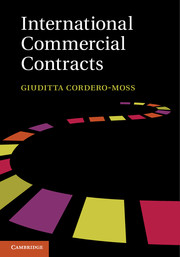Book contents
- Frontmatter
- Contents
- Preface
- Introduction
- 1 Contract practice and its expectations in terms of the governing law
- 2 The role of transnational law
- 3 The impact of the governing law
- 4 Which state law governs an international contract?
- 5 Does arbitration ensure a self-sufficient contract?
- 6 Conclusion
- Bibliography
- Index
- References
5 - Does arbitration ensure a self-sufficient contract?
Published online by Cambridge University Press: 05 June 2014
- Frontmatter
- Contents
- Preface
- Introduction
- 1 Contract practice and its expectations in terms of the governing law
- 2 The role of transnational law
- 3 The impact of the governing law
- 4 Which state law governs an international contract?
- 5 Does arbitration ensure a self-sufficient contract?
- 6 Conclusion
- Bibliography
- Index
- References
Summary
Commercial arbitration, whether domestic or international, is an alternative method of dispute resolution. This means that it is an alternative to the courts of law: if the parties so elect, and if the governing law permits submitting the relevant kind of disputes to arbitration, the parties may decide to exclude the jurisdiction of ordinary courts and to subject their dispute to arbitration instead. It is very common to see an arbitration clause in a commercial agreement specifying that disputes arising out of the contract are to be submitted to arbitration.
Let’s assume a contract with a clause subjecting it to a certain law, and let’s assume that the contract violates the law that would be applicable if it was not for the choice-of-law clause: for example, a shareholders’ agreement between a Norwegian and a Russian party regarding a company that they jointly own in Russia. The shareholders’ agreement has a clause choosing Swedish law to govern the contract and the content of the agreement violates Russian company law (for example, because it provides for a division of competence between the various corporate bodies that is not in compliance with Russian law). Russian law could have been invoked by one of the parties as a defence to rebut the other party’s allegations of breach of contract: the first party would allege that it could not comply with its obligations under the contract because performance of that obligation would have been illegal under the law of the place where the performance was to be made. If the contract contains an arbitration clause, does the arbitral tribunal have the power to disregard the choice of Swedish law made by the parties in the contract and apply Russian law instead? And what if none of the parties invokes Russian law: could the arbitral tribunal nevertheless take it into consideration on its own motion – to avoid rendering an award that would violate mandatory rules in the place where it most probably would be enforced?
- Type
- Chapter
- Information
- International Commercial ContractsApplicable Sources and Enforceability, pp. 210 - 307Publisher: Cambridge University PressPrint publication year: 2014



